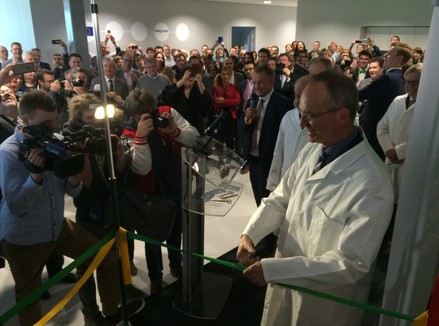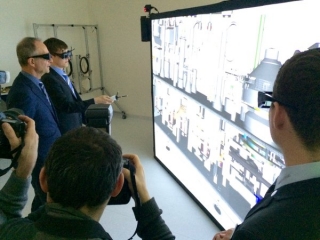Opening of Biotech Training Facility Leiden with Minister Kamp
Minister Kamp van Economische Zaken heeft het eerste trainingscentrum in Nederland geopend voor farmaceutische bedrijven, apotheken en ziekenhuizen. De Biotech Training Facility heeft ruim opgezette laboratoria, stofvrije ruimten en een volledig ingerichte technische ruimte. In Europa beschikte alleen Ierland over een vergelijkbare faciliteit.
Het trainingscentrum vervult een grote behoefte aan up-to-date nascholing van laboratorium personeel. Door training kunnen problemen in het productieproces worden voorkomen die nadelige gevolgen hebben voor de levertijd en kosten van medicijnen. Het centrum draagt daarmee bij aan de betaalbaarheid, betrouwbaarheid van levering en de veiligheid van medicijnen.
Minister Kamp: ‘Het trainingscentrum is een belangrijke aanwinst voor de topsector Life Sciences & Health. We doen het internationaal goed. De kwaliteit van Nederlands biomedisch onderzoek is uitstekend en Nederlandse bedrijven zijn in trek bij buitenlandse farmaceuten. Goed gekwalificeerd personeel is onontbeerlijk voor ons succes en helpt bij het aantrekken van nieuwe bedrijven en investeringen in Nederland.’
In de topsector Life Sciences & Health zoeken startups, gevestigde bedrijven en onderzoeksinstellingen naar oplossingen voor de vergrijzende bevolking, de verhoging van de kwaliteit van leven en beteugeling van de zorgkosten. De topsector richt zich op samenwerkingen tussen bedrijven en overheid, en op het bedrijfsmatig bruikbaar maken van wetenschappelijk onderzoek.
De Biotech Training Facility is het resultaat van een samenwerking tussen een groot aantal partijen. De financiering komt van het Europees Fonds voor Regionale Ontwikkeling (EFRO), het ministerie van Economische Zaken, gemeente Leiden, LUMC en ABN AMRO. De Universiteit van Leiden heeft onder meer de grond geschonken waarop Biotech Training Facility gebouwd is. Diverse bedrijven hebben apparatuur, materialen en personeel beschikbaar gesteld.
Het nieuwe trainingscentrum maakt deel uit van Leiden Bio Science Park. Hier werken 93 bedrijven en 11 kennisinstellingen op gebied van biotechnologie aan onderzoek, ontwikkeling en productie van nieuwe geneesmiddelen, therapieën en producten voor diagnostiek. Het Park beslaat een terrein van 110 hectare; biedt werk aan 17.000 mensen en ruimte voor 30.000 studenten. Het Leiden Bio Science Park is het grootste cluster voor biomedische levenswetenschappen in Nederland, behoort tot 5 meest succesvolle Europese kennisclusters en staat 9e op de wereldranglijst van medicijnontwikkeling.

Speech of Minister Kamp at the opening:
Ladies and gentlemen,
A sewing machine motor, sausage casings and aluminium taken from a crashed German bomber. That’s what Dr Willem Kolff used back in the Second World War to build the world’s first artificial kidney. It was an enormous contraption. But it kept a dying kidney patient alive for four weeks.
Dr Kolff’s artificial kidney sparked a technological revolution in medicine. Today, the field of regenerative medicine builds on Dr Kolff’s insight that physical illness often has a mechanical component. Meaning that it can be fixed.
For example, doctors and researchers at Leiden University and its medical centre, LUMC, are doing ground-breaking research on stem cells that can be used by the body to repair damaged organs. Scientists may even be able to grow completely new organs in the future.
As for the artificial kidney: it’s about to enter a new phase. As a result of joint efforts with the Kidney Foundation, the first portable artificial kidney should be ready for testing by the end of next year. It’s not the first time that pooling the expertise and experience of knowledge institutions, companies, civil society organisations and public authorities has led to game-changing discoveries.
It’s also this kind of innovation that we need to make our economy grow. The Netherlands is one of the top five most competitive economies in the world. We’re keen to consolidate that position. And we see the best opportunities in innovations that solve major social challenges. Like feeding the growing global population. Healthy ageing. And helping people live independently in their own homes for as long as they can.
The nine top sectors identified by the Dutch government lead their field internationally in terms of innovation. The top sector Life Sciences and Health is a case in point. It’s a strong international performer. And the quality of Dutch biomedical research is outstanding. That’s why foreign drug companies have been so eager to buy Dutch R&D spin-offs like Acerta Pharma and Prosensa.
2015 was a good year for the sector. It stepped up collaboration with healthcare funds like the Dutch Heart Foundation and the Dutch Cancer Society. This led to an substantial increase in the sector’s budget. Innovation isn’t only about research, however. It’s also about applying new findings. Medical advances don’t always reach patients. That’s why the ministry of Health and my ministry have jointly introduced Health Deals. Like Green Deals for achieving sustainability goals, these are agreements with private parties and civil society actors on achieving innovation in health care. Medical advances that have real added value for patients. And that save money. Health minister Edith Schippers and I have high expectations of these Deals.
In order for the top sectors to function properly, it’s important to have enough highly skilled staff. So, at the end of last year, the nine sectors set out the Human Capital Roadmap for a highly skilled workforce. Later this year, Life Sciences and Health will present its own Human Capital action plan.
As the Roadmap points out, the top sectors want to bolster their ties with institutions of vocational and higher professional education. By 2019, the expertise centres run by universities of applied science and secondary vocational institutions should have doubled their innovative capacity. And both the government and the top sectors are aiming for four out of every ten graduates to have a science or engineering degree.
For students interested in studying pharmacy, Leiden is the place to be. It’s my pleasure to open the new Biotech Training Facility today. Its labs and cleanrooms offer a unique environment for advanced practical training in the Netherlands.
The new Facility is a wonderful addition, first of all, to Leiden’s Bio Science Park. It’s also a boon for the life sciences and health sector, which wants to make lifelong learning a reality. This facility is not only for students; it’s also intended for scientists, pharmacists, hospital staff and lab technicians.
Ladies and gentlemen,
If Willem Kolff were still alive, he might have tested his equipment at the training facility. This testing ground is an example of what can be achieved when business professionals, scientists, civil society actors and public authorities get together in a single network. It’s one of the sector’s many innovations. And a major step forward for Dutch biomedicine.
I wish you all every success in your work here!
Source: Ministry of Economic Affairs
Visit the website of the Biotech Training Facility.

